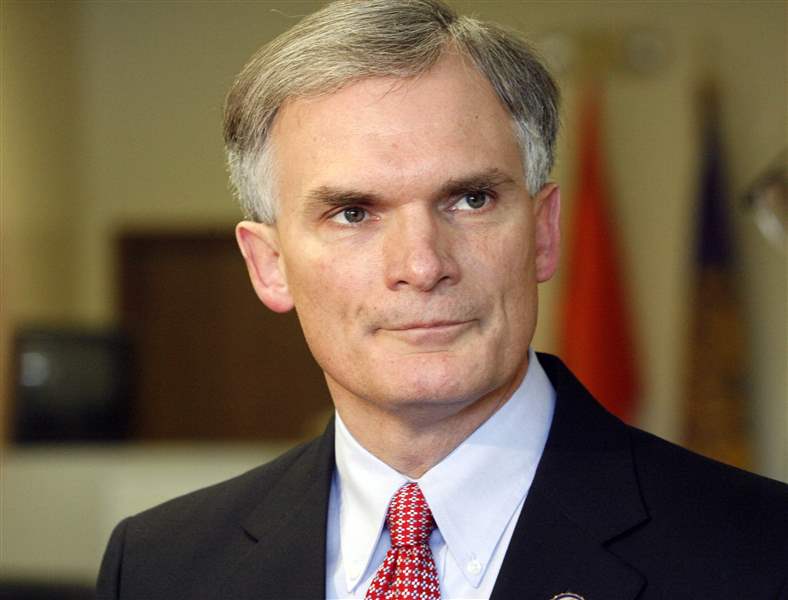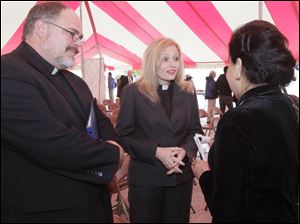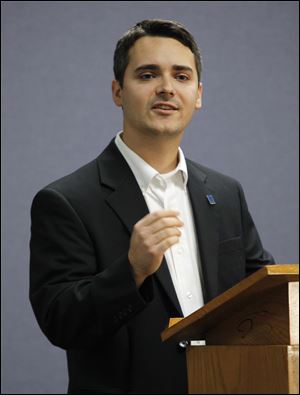
Candidates mix politics, religion in 5th District race for Congress
10/13/2012
U.S. Rep. Bob Latta, R-Bowling Green.
The Blade/Amy E. Voigt
Buy This Image

Rev. Angela Zimmann, center, is a Democrat challenging incumbent Bob Latta, R-Bowling Green, in the 5th Congressional District.
Religion and politics are two topics people traditionally don’t include in “polite conversation.” Even though the Constitution separates church and state, in a way they impolitely belong together.

5th Congressional District seat Libertarian candidate Eric Eberly.
When an ordained minister seeks public office, some people don’t give it a second thought; a few defer, thinking of a “higher power,” and others are wary that theology and government could intertwine.

U.S. Rep. Bob Latta, R-Bowling Green.
The Rev. Angela Zimmann of Springfield Township is an ordained minister. She is the Democratic candidate for the 5th Congressional District and is on the ballot alongside incumbent U.S. Rep. Bob Latta (R., Bowling Green) and Libertarian Eric Eberly, also of Bowling Green. Mr. Latta and Mr. Eberly graciously agreed, in the midst of an election, to talk about religion and public office for a story focused on Ms. Zimmann and her pastoral presence.
“A lot of people have been positive” about Ms. Zimmann being a pastor, she said. Some Democrats, while saying she’ll get their vote, ask about the extent her faith influences her as a potential member of Congress.
“I say, well, our values always affect the choices we make. That’s part of who I am, but to say that I’m going to force that on everyone else is not at all a part of who I am,” she said.
Said Mr. Latta, “I’ve never really given it a thought” that Ms. Zimmann is a pastor. He said that his friend U.S. Rep. Tim Walberg (R., Tipton, Mich.) is a minister, so he doesn’t see it as unusual to have clergy in a congressional race.
“I think people are running for office for what they stand for,” Mr. Latta said, “so when I say I don’t give it a thought, it’s not that it’s not important,” it’s that voters are looking for a stand on issues.
Even among believers there are differences.
“I’ve had a few people say they don’t believe that a woman should be a pastor,” Ms. Zimmann said, “so that alienates them against my candidacy, but I figure if someone’s going to think that a woman shouldn't be a pastor, they’re not going to vote for me anyway.”
Ministers “have a right as anyone else” to seek office, Mr. Eberly said. “One can question their ability to separate their religious vocation from public office. Obviously their religion is going to influence” their service, but that’s the voter's decision.
“Look at a person’s belief” when deciding how to vote, Mr. Latta said, “and not so much whether they’re ordained or not.”
What are Ms. Zimmann’s beliefs?
“I was raised Lutheran and my approach has been to work that open-minded, justice-oriented theology through the Lutheran Church. I believe ‘do unto others,’ and our legislation should protect the weakest, the most vulnerable members of society as part of the function of the government,” she said.
“It’s to legislate not morality but safety, and people should be able to do pretty much what they want to do within the boundaries of making sure that other people are safe and it doesn’t impinge on someone else’s freedoms.”
Ms. Zimmann is a pastor in the Evangelical Lutheran Church of America. She had served full-time as a parish minister for six years, then sought a doctoral degree in rhetoric at Bowling Green State University.
For the past nine years she has been the part-time minister of Trinity Lutheran Church in Riga, Mich., and taught writing at BGSU.
She and her husband, the Rev. Martin Zimmann (a Lutheran pastor), have lived their faith as foster parents since 2008, though right now their only children are their natural son and daughter.
“To bring a child in who’s already been disrupted from their home and to put them” in the midst of a campaign “would be too much for a child," she said.
Mr. Eberly, like Ms. Zimmann, is a Lutheran, a member of St. Mark’s in Bowling Green.
“It’s a private issue,” he said.
Mr. Latta is Roman Catholic. He serves as an usher at St. Thomas More University Parish in Bowling Green and is also active in the Congressional Prayer Caucus. He said that religious opportunities are nearby in the Capitol.
“A lot of people don’t realize that we have a chaplain of the House and a chaplain of the Senate,” he said. “Every session [of Congress] starts with a prayer. And right off the Rotunda is a prayer room with a beautiful stained glass window of George Washington kneeling and praying at Valley Forge.”
Mr. Eberly supports religion’s relationship with government in freedom of religion.
“I don’t agree that it’s freedom from religion,” he said.
The freedom is seen in having “no national religion, no theocratic rule.”
Many members of Congress have a close faith; some voters support their representatives’ religious practices, others prefer that beliefs and legislation have space between them.
And an ordained minister is not extrareligious. Faith is part of it, but ministry is also a profession.
A pastor has job skills that might transfer to lawmaking — as does an attorney, and as does a real estate agent.
For a minister, “there is the ability to listen to a multiplicity of viewpoints and work to build consensus and collaboration,” Ms. Zimmann said.
“When you’re a pastor and you serve in a congregation, you start to hear more disparate views and experiences,” she said. “That ability to learn and listen and value different viewpoints and see that there’s not just one right answer to be nuanced is a huge part of leadership.”
And then there’s the preacher’s role. Not just making speeches, but having a prophetic voice, speaking up to lead, to bring people together, or to call for change.
“When I first graduated from seminary,” Ms. Zimmann said, “I was 25 and I felt that was one of my gifts. But I realized that if I used that voice before people trusted me to be that voice, it was like howling into a vacuum.
“The congregation would say, ‘You're pushing us to do something, but we don’t even know that you love us yet.’ Once that trust has been established, [constituents] can perhaps trust me to say, ‘You may need to go in this direction, which may not be exactly what you originally thought, but trust me.’
“That takes time.”
Also, consider the calling.
“Part of what my calling to be in government has been about is we’ve got some tough years ahead as we recover from different things and different challenges that are faced.
“We need competent leadership in there to work on caring for the vulnerable in our society, the children, the elderly, the hungry, the poor. This is the whole point of it.”
Contact TK Barger at: tkbarger@theblade.com or 419-724-6278.